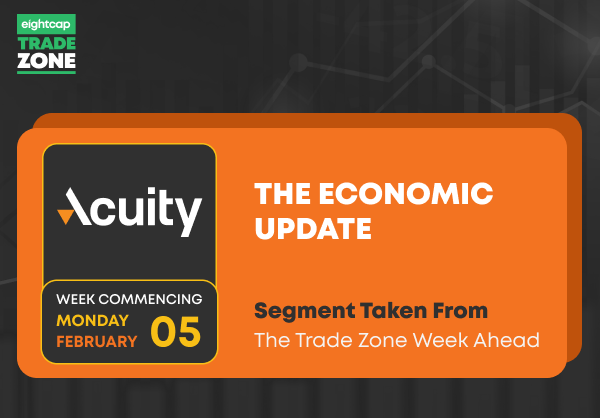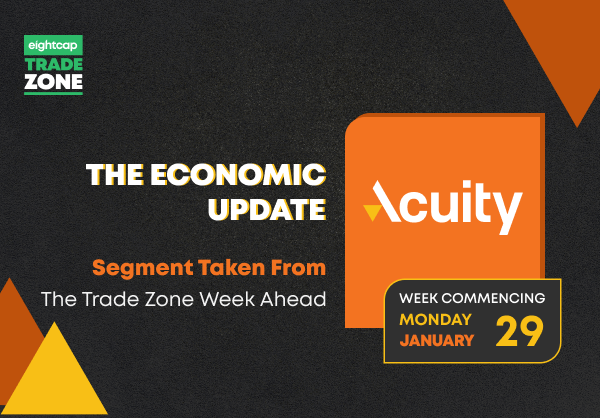
EightcapTrade Zone
Get regular trading inspiration from our world-renowned experts.
Plan your trades with insights for the upcoming trading week.

Economic Insights Revealed | Better Navigate This Week’s Economic Events | 05.02.24
Date: February 05, 2024
Host: Joe Jeffriess
Look into the latest market trends, data releases, rate announcements, and key economic indicators shaping the markets during the upcoming week

Gain a Better Understanding of Economic Trends | 29.01.24
Date: January 29, 2024
Host: Joe Jeffriess
Analyse all the key events, such as central bank insights and other crucial indicators that will influence the markets in the upcoming week.
What’s on The Economic Horizon This Week? | 22.01.24
Date: January 22, 2024
Host: Joe Jeffriess
As we stand at the start of the new trading week, join us in exploring the economic horizons that will shape this week's market dynamics.
Prepare your trading strategy with comprehensive market forecasts.

Strategic Trading Moves | The Latest Insight From Today’s Asian and Australian Sessions | 05.02.24
Date: February 05, 2024
Host: Joe Jeffriess
Unravel key insights from the Asian and Australian trading sessions to explore market trends, potential opportunities, and tactical approaches to help you make better trading decisions and navigate the financial landscape.

Strategic Insights To Help You Navigate The Financial Landscape | 29.01.24
Date: January 29, 2024
Host: Joe Jeffriess
As we get set to close the trading month, join us in gaining strategic insights that can pave the way to expand your trading know-how.

Mastering The Australian and Asian Trading Sessions | 22.01.24
Date: January 22, 2024
Host: Joe Jeffriess
Stay ahead of the curve with our expert perspectives of the Asian and Australian trading sessions, uncovering market trends, potential opportunities, and strategic insights to empower your trading decisions.
Find your next opportunity with insightful market analysis.

April 26, 2024
Bitcoin | Price Analysis | Bullish Breakout or Fake Rally? | CRYPTO
Today's BTC update: possible higher low formation at support levels 63,860 and 60,675. Resistance at 66,710. Will we see a bullish push or a bearish turn? Stay tuned.
Read more

April 24, 2024
GBPUSD | Daily Analysis | Bullish Break or Bearish Bounce? | FOREX
Today, we dissect GBPUSD's downtrend. With support at 1.2330 and resistance at 1.2456, we ponder whether buyers can defy the trend. Join us as we analyze potential shifts in this daily chart.
Read more

April 23, 2024
XAUUSD | Price Analysis: Correction or Reversal? | METALS
Hello, traders! In today's gold analysis, we observe a correctional phase on the daily chart. We explore recent price movements and what they might mean for future trends. Keep an eye on the next rally for key signals.
Read more











